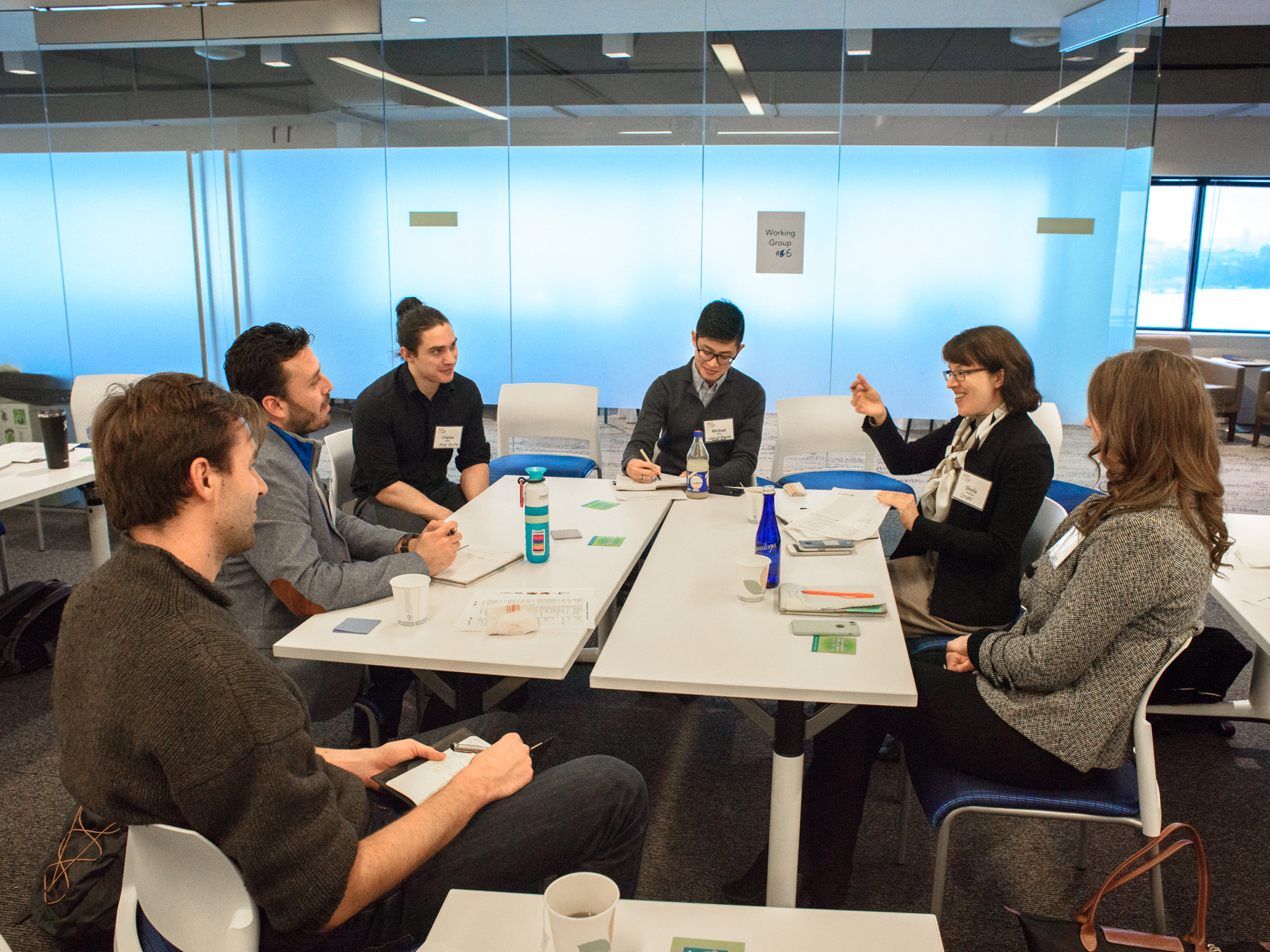Menu
Metro Lab Initiative Course 2018
Metro Lab Initiative Course 2018: Co-creating the metro discipline & Metropolitan environmental solutions
From January 8th to January 19th, the MIT Metro Lab and the MIT Environmental Solutions Initiative (ESI) held a two-week peer-learning course revolving around the creation of the ‘Metropolitan Discipline’ and how it can be used to address issues relating to urban planning and sustainability. The course consisted of two one-week modules; the first week taking place at ESI’s office and emphasizing environmental issues, and the second taking place in the Department of Urban Studies and Planning on MIT’s campus.
 Each day consisted of morning lectures and collaboration-focused workshops in the afternoons. Participants from Latin America, Asia, Europe, and the US worked with twenty-one instructors from multiple disciplines with a focus on cities and infrastructure. On the first day ESI Director John Fernández, kicked off the event with a presentation on the value and application of the field of Urban Metabolism in understanding the resource requirements of urban economies. During the two weeks a diverse variety of instructors spoke, including Raf Tuts, Director of Un-Habitat; Rita Cestti of the World Bank; Pablo Bereciartua, Secretary for Water Resources for Argentina, and José Luís Inglese, CEO of Argentina’s largest water company, AySA, among others.
Each day consisted of morning lectures and collaboration-focused workshops in the afternoons. Participants from Latin America, Asia, Europe, and the US worked with twenty-one instructors from multiple disciplines with a focus on cities and infrastructure. On the first day ESI Director John Fernández, kicked off the event with a presentation on the value and application of the field of Urban Metabolism in understanding the resource requirements of urban economies. During the two weeks a diverse variety of instructors spoke, including Raf Tuts, Director of Un-Habitat; Rita Cestti of the World Bank; Pablo Bereciartua, Secretary for Water Resources for Argentina, and José Luís Inglese, CEO of Argentina’s largest water company, AySA, among others.
“The objectives were primarily to show the case of Cuenca Matanza Riachuelo, because the truth is that it is an emblematic case on the international level,” said Dorina Bonetti, the president of ACUMAR and an instructor for the workshop.
The Autoridad de Cuenca Matanza Riachuelo (ACUMAR) is the government organization in charge of the Matanza Riachuelo Basin, an area of land overlapping with Buenos Aires that encompasses the Matanza-Riachuelo river. Currently, 1.7 million residents of the basin live in poverty and many do not have access to potable water or sanitation. In 2008, the Integral Sanitation Plan (PISA), managed by ACUMAR, was developed as an effort to address the pollution of the river as well as to improve the quality of life of informal settlements that exist bordering the water. The river acts as a unifying element for the social, environmental, and economic issues that exist in this area, all of which are within the scope of ACUMAR’s purpose.
“[…] The three jurisdictions that oversee cleaning it up and improving the quality did not do so for many years,” said Bonetti. These three jurisdictions are the national government, the province of Buenos Aires, and the City of Buenos Aires.
Agua y Saneamientos Argentina (AySA) is the company that provides potable water and sewage drain collection services to the city of Buenos Aires and twenty-five of its surrounding sub-regions (including the areas surrounding and encompassing the Matanza Riachuelo Basin). Given that this is one of the most densely populated areas in Argentina, the provision of efficient and sustainable water services is paramount to the ongoing effort to create substantial infrastructure for the future growth of the city.

This focus on urban planning and resource infrastructure made this example an ideal case study for the MIT Metro Lab to explore with ESI.
“It is a matter of scale, but it is also a matter of complexity, and complexity is linked to fragmentation,” said Gabriel Lanfranchi, founder and director of the MIT Metro Lab, when asked about the relevance of the metropolitan discipline in this case. “For example, you cannot tackle inequality just from a municipality, same thing with climate change.”
The two-week long workshop culminated in the presentation of final group projects designed to summarize the rationale and the arguments for the co-creation of a ‘metropolitan discipline’.
“We wanted to see if the participants would be able to come out with ideas and possible solutions, especially since we were working with the Environmental Solutions Initiative,” said Lanfranchi.
In the future, the MIT Metro Lab will be working closely with ESI to bring the challenges of metropolitan regions to faculty and students. Lanfranchi also aims to expand the scope of the workshop to encompass other cases from around the world that go beyond Latin America.
“[Another achievement] is the fact that we found the ESI as a good partner for this initiative… I found a lot of empathy, which is very important for the course, and I also think that it will bring good results for the ESI,” said Lanfranchi.
This thought was echoed by Fernández: “The challenges of cities, especially in the global south, offer some of the very best possibilities for environmental solutions. We are in the midst of the largest and most rapid expansion of urban populations and the emergence of enormous metropolitan regions in many countries poses a new reality. We are looking forward to working closely with the Metro Lab, AySA, ACUMAR, the government of Argentina and others in contributing to a sustainable future of cities.”
The event was organized by MIT Metro Lab director Gabriel Lanfranchi and ESI Director John Fernández. Lanfranchi is currently Director of Cities at CIPPEC, an independent thinktank based in Buenos Aires that works toward building better public policies to address issues in inequality and development. The workshop is intended as an annual IAP offering and was supported by the MIT ESI, AySA, ACUMAR, and CIPPEC.
Contributed by: Federico Toro, ESI Program Intern
















